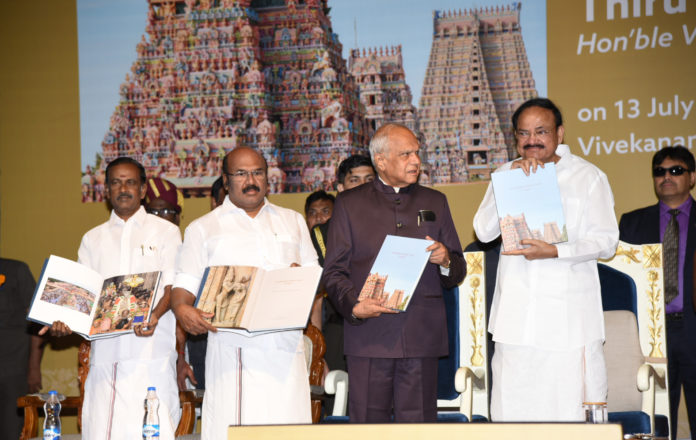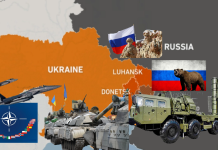
There should not be an imposition of any language, nor opposition to any language asserts VP
Protecting and preserving Indian languages is true nationalism and patriotism: Vice President;
Advises state governments to link employment with the native language up to a certain level.
Participates in the Golden Jubilee Celebrations of Central Institute of Indian Languages.
Posted On: 13 JUL 2019 2:11PM by PIB Delhi
The Vice President of India Shri M Venkiah Naidu today asserted that there should not be imposition of any language, while maintaining that there must not be opposition to any language at the same time.
The Vice President said ‘languages must unite us in the cause for inclusive and sustainable development and must not end up as tools to divide us. There should be no imposition of any language nor should there be opposition to any language”
Inaugurating the Golden Jubilee Celebrations of the Central Institute of Indian Languages (CIIL) in Mysuru, the Vice President said language should become a catalyst for inclusive development. He said that the promotion of one language was not tantamount to undermining or opposing other languages.
Shri Naidu said that in a democracy, especially in a knowledge economy like India. ‘We must not foster the tendency to discriminate between people based upon their ability or inability to speak a particular language,’ he added.
Emphasizing the importance of protecting and conserving India’s unique and rich linguistic heritage, he said it was extremely disheartening to learn that 196 languages of our country are classified as endangered. ‘We may have to ensure that this number doesn’t increase. We have to protect and preserve our languages and the best and only way is to constantly use them,’ he added.
Shri Naidu described protecting and preserving Indian languages as true nationalism and patriotism. He said ‘languages are the life blood of identity and play a significant role in strengthening bonds among people.’
Calling for multi-pronged approach to preserve and develop Indian languages, the Vice President said that it was time to rethink and reinvent the entire language education in our country. “We must start by making the mother tongue the medium of instruction in schools at least at the primary level or up to 8th grade,” he added.
Referring to studies, which established that teaching of mother tongue at the initial stages of education gives impetus to the growth of mind and thought and makes children more creative and logical, Shri Naiducalled for usage of native languages at home, in the community, in meetings and in administration.
‘We must accord a sense of dignity and pride to those who speak, write and communicate in these languages,’ he added.
The Vice President also advised every state government to medium of instruction in mother tongue mandatory up to 5th or 8th grade. He also wanted the state governments to link employment with the native language up to a certain level. “Every officer must be familiar with the local language’, he added and suggested that the sign boards on shops, establishments and other institutions must be represented in local language and any other language of choice.
Observing that India was linguistic a treasure trove, a nation widely acknowledged for its extraordinary linguistic and cultural diversity, the Vice President said that the plurality and co-existence of multiple languages add colour and vitality to our country and makes it unique.
‘Our languages are a repository of our collective knowledge and wisdom which we have amassed over the course of the long journey of our vibrant civilization,’ he added.
The Vice President visited the Center of Excellence for Studies in Classical Telugu and enquired about the research undertaken by them in connection with promoting and preserving the classical language.
He also visited an exhibition displaying the activities of Central Institute of Indian Languages (CIIL) including reviving old languages, developing tools for better understanding and research of primitive and indigenous languages.
On the occasion of Golden Jubilee Celebrations of CIIL, Shri Naidu laid the foundation stones for three regional language centres to be setup at Bhubaneswar, Patiala and Solan. The Vice President launched a journal of Classical Telugu and released the book- Telugu Siri.
The Vice President also felicitated the founder director of CIIL, Prof D P Pattanayak.
Shri PratapSimha, Member of Parliament, Mysore, Shri. The Mayor of Mysore, Smt. PushpalathaJagannath, Sanjay Kr Sinha, Joint Secretary, Ministry of HRD, and the Director CIIL Shri D.G. Rao were present.
The following is the full text of the speech:
I am delighted to be here with all of you at the Golden Jubilee Celebrations of the Central Institute of Indian Languages (CIIL).
CIIL was established in Mysore in 1969. During the course of five decades of its functioning, the Institute has made stellar contributions to the growth and development of Indian languages.
I am happy to know that, in addition to promoting languages of India, CIIL also acts as an advisor to the Government on issues related to language policy and language planning. The Institute has had the unique distinction of working on almost all aspects of language and on most major, minor, tribal, lesser-known and endangered languages of India.
I am also glad that this Institute has established five Regional Language Centers (RLCs) and two Urdu Teaching and Research Centers (UTRCs).
I am happy that the Institute, through its schemes such as National Translation Mission (NTM), National Testing Service India (NTS-I) and ‘Bharatavani’, has been working on the creation of resources and technology for developing the languages of India.
I applaud the Institute for striving to further develop classical languages such as Tamil, Sanskrit, Telugu, Kannada, Malayalam and Odia so that these languages of antiquity may be protected and the knowledge encoded in them is made accessible to all.
Golden jubilee is an important milestone in the journey of an institution. It is a time for celebration as well as introspection, a time to revel in the glory of achievements made and a time to set new goals and targets for the future.
Let me take this opportunity to congratulate everyone who toiled hard to take CIIL to this exalted position.
My dear sisters and brothers,
The great Indian poet Acharya Dandi, had said that if the light of language does not exist, we will be groping in a dark world.
Language is a tool for intellectual and emotional expression.
It is a vehicle of intergenerational transmission of culture, scientific knowledge and a worldview.
It is the vital, unseen thread that links the past with the present.
It evolves with human evolution and gets nourished by constant use.
Our languages are a crucial part of our history, our culture and our evolution as a society.
In fact, they are the lifeblood of our identity, both individual and collective and our traditions and customs. They play a significant role in creating and strengthening bonds among the people.
In short, our languages permeate every single facet of our day to day life and form the very basis of our civilization.
India is linguistic a treasure trove, a nation widely acknowledged for its extraordinary linguistic and cultural diversity. The plurality and co-existence of multiple languages add color and vitality to our country and makes it unique.
Indian languages have always been celebrated for their scientific structure and phonetic, uncomplicated spellings and clear grammatical rules. Our languages also been vehicles of our vast and highly sophisticated ancient, medieval, and modern literature.
More than 19,500 languages or dialects are spoken in India as mother tongues, according to the Language Census.
There are 121 languages which are spoken by 10,000 or more people in India.
Languages are never static, but dynamic living social phenomena. They grow, shrink, transform, merge, and sadly, die.
It is extremely disheartening to learn that 196 languages of our country are classified as endangered. We may have to ensure that this number doesn’t increase. We have to protect and preserve our languages and the best and only way is to constantly use them.
Our languages are a repository of our collective knowledge and wisdom which we have amassed over the course of the long journey of our vibrant civilization.
Our tribal languages, many of which are headed towards extinction, are treasure troves of knowledge about a region’s flora, fauna and medicinal plants.
When a language declines, it takes with it an entire knowledge system and a unique perspective of viewing the universe. The traditional livelihood patterns disappear along with their special skills, arts, crafts, cuisine and trade.
A number of factors such as the lack of teaching-learning materials to the proliferation of internet that is dominated by a handful of languages have led to the stagnation of many of our languages.
I have always emphasized the importance of protecting and conserving our unique and rich linguistic heritage.
My dear sisters and brothers,
Language preservation and development needs a multi-pronged approach.
It is the time we rethink and reinvent the entire language education in our country. CIIL has already taken new initiatives. It should continue to be a model in the field of research and development of languages.
We must start by making the mother tongue the medium of instruction in our schools at least at the primary level.
A number of studies conducted all over the world by different expert groups have established the fact that teaching of mother tongue at the initial stages of education gives impetus to the growth of mind and thought and makes children more creative and logical.
We must also not fail to teach our children multiple languages in order to widen the horizon of their understanding of both literature and science.
The inadequate availability of pedagogical materials and technology in several indigenous languages has posed a serious challenge for the country.
Since education is one of the instruments for the growth of self, society and the nation, language or languages should not become the barrier of education.
It is heartening to note that the new draft National Education Policy puts forth a number of suggestions for supporting education in home languages and mother tongues, tribal as well as sign languages.
The policy rightly states that children have the potential to acquire multilingual skills and these need to be encouraged at the earliest.
It suggests that education could be in the mother tongue at least till Grade 5 but preferably till Grade 8, with a flexible, bilingual language approach where necessary.
It calls for the implementation of the three-language formula in letter and spirit throughout the country and emphasizes special measures to be taken to develop and recruit language teachers.
I do hope the recommendations contained in the New Education Policy will be discussed with objectivity and foresight so that the children and youth build excellent language competence to navigate the multi-lingual globalized world of the 21st century.
I hope that more and more people will start using their native languages at home, in the community, in meetings and in administration.
More people should write poetry, stories, novels and dramas in Indian languages. We must accord a sense of dignity and pride to those who speak, write and communicate in these languages.
We must encourage Indian language publications, journals and children’s books. Dialects and folk literature must be given adequate focus.
Language should become a catalyst for inclusive development.
Language promotion should be an integral part of good governance.
Swami Vivekananda once said that Language is the chief means and index of a nation’s progress.
Our languages must serve as means of empowerment of the masses.
The Parliament of India now allows its members to express themselves in any of the 22 scheduled languages. We must explore the possibility of permitting our Parliamentarians to speak in their mother tongues in the House. We must leverage all possible avenues of technology to make this possible.
The Supreme Court of India has recently decided to make available its judgements in six vernacular languages, to start with. This is a positive step in the direction of removing language barriers and ensuring equal access to justice.
The Finance Ministry has decided to conduct examinations for employment in Regional Rural Banks in 13 regional languages in addition to English and Hindi.
All these initiatives will help in creating a level playing field.
Many more bold decisions must be made to protect and nurture our languages.
In a democracy, especially in a knowledge economy like India, we must not foster the tendency to discriminate between people based upon their ability or inability to speak a particular language.
My dear sisters and brothers,
I always say that innovation is the watchword of the 21st century. Innovation is an imperative, if we are to progress. To foster innovation, it is very important to develop scientific vocabulary in our regional languages.
The draft National Education Policy has taken a step in this direction by proposing to renew and vastly expand the mandate of the Commission for Scientific and Technical Terminology to include all disciplines and fields, and not just the physical sciences.
With technology taking over all walks of life, it is of paramount importance that we make technology tools and resources available in regional languages as well.
Today cheap smart phones and data plans have made internet available in almost all rural areas.
Research suggests that if regional language content is also made available online, then more rural population would start using internet.
This will usher in an era where there will be more internet consumption, greater growth, more literacy, better health and greater economic boost for the country.
India has the largest youth population in the world, 65% of its population is below 35 years of age. We must incentivize this energetic generation of young people to keep alive their mother tongues and dialects. We must teach our children to love languages and equip them to protect and nourish the beautiful legacy of languages that we have received from our ancestors.
Our languages must unite us in the cause for inclusive and sustainable development and must not end up as tools to divide us. There should be no imposition of any language, nor should there be any opposition to any language.
Every language is important and worth our efforts in preserving and propagating it. Let us strive to communicate with each other and understand each other better.
I invoke one of the mottos of the Institute,
‘Learn more languages, earn more friends.’
Our tongues might very well be different but we are all part of the same great civilization and we share common aspirations and goals. Let us deepen our bonds of friendship by learning as many language as possible without neglecting our mother tongue. Let us learn languages out of love for them, for the people who speak them and for the knowledge that is available in them. Also, let us learn the language well at a high level of proficiency,
Let me once again congratulate CIIL and everyone associated with it on this historical occasion of golden jubilee celebrations.
I wish you all the very best in your future endeavors.
Thank you
Jai Hind!





















